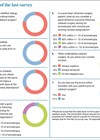
This edition’s survey results are fascinating. They focus more on your impressions and views rather than on the facts of your clinical practice. Effectively I asked you to take the role of an expert and comment on the cases I presented. You adopted the role of the medical expert and decided whether there was a breach of duty.
This is something that I have to do on a daily basis, however, it is vital to recognise that ultimately it is not my, or any other doctor’s (be they an expert or not) decision, instead it is for the Court to decide. We act solely to advise them and whoever instructs us, be it the defendant or the claimant, our duty is to the Court and our opinions should not vary whoever pays our bills.
We have to determine whether there was a breach in the duty of care to the claimant. The standard of care we try to utilise is detailed in the classic direction of McNair J to the jury in Bolam vs Friern Hospital Management Committee (1957) 0118:
“A doctor is not guilty of negligence if he has acted in accordance with the practice accepted as proper by a reasonable body of medical men skilled in that particular art […] putting it the other way round, a doctor is not negligent, if he is acting in accordance with such a practice, merely because there is a body of opinion which takes a contrary view.”
The Bolam Test was developed and evolved in the case of Bolitho which is the authority for the proposition that any body of medical opinion relied upon to defend a particular treatment or practice must also be rationally defensible. Lord Brown Wilkinson in the House of Lords suggested:
“The use of these adjectives – responsible, reasonable and respectable – will show that the Court has to be satisfied that the exponents of the body of opinion relied on can demonstrate that such opinion had a logical basis. In particular, in cases involving, as they so often do, the weighing of risks against benefits, a Judge, before accepting a body of opinion as being responsible, reasonable or respectable, will need to be satisfied that, in forming their views, the experts have directed their minds to the comparative risks and benefits and have reached a defensible conclusion of the matter.”
This effectively means that even if other clinicians do the same thing it does not absolve the clinician of breaching duty if the action is illogical and unreasonable. As an expert we therefore opine a breach of duty where we believe that the conduct was not in accordance with an approved and rationally defensible medical practice at the time.
When discussing causation, we use the question, “On the balance of probabilities, but for the alleged breach of duty, would the adverse outcome have occurred?” Where there are several causative factors which combine together to cause the pertinent outcome, we endeavour to opine whether the alleged breach of duty materially contributed to the pertinent outcome.
The first case is a scenario I sadly see frequently and not just in my medico-legal practice. Many years ago, I was appointed as a glaucoma consultant in a unit that had never had one before – I was suddenly faced with lots of patients like this who had been watched to blindness. Over the years, the pressures were 20mmHg and deemed to be fine. The visual field gradually got worse and worse until it was too bad to risk a trabeculectomy. Thankfully, our glaucoma care has markedly improved and this is hopefully something that is now a historical phenomenon.
The concept of target pressure is something I like. In my number 2,092,233 (Amazon ranking of all books) best-selling textbook entitled Glaucoma Shared Care (Wiley-Blackwell; 1st edition, 9 April 2008) I define a target pressure as: “The target IOP is the IOP at a certain point in an eyes diurnal IOP curve at which it is felt that the progression of the patient’s glaucomatous optic neuropathy will not result in significant patient specific visual morbidity in that patient’s lifetime. Achievement of target IOP should take into account the risk versus benefit profile for any intervention designed to achieve it.”
The patient in question one never attained their target pressure and no one really looked at their visual field progression. They should have had some form of intervention to reduce their IOP and stop their visual loss. Not to do so is, in my opinion, a breach of duty, and 85% of you agree.
The next question referred to a patient where we are concerned that she may have occludable angles and furthermore there may be intermittent angle closure. At the time of the assessment at the optician, the pressures are fine and the optic discs are healthy, so the patient is a primary angle closure suspect. When triaging the patient, 8% of you felt that a routine appointment was appropriate, 48% felt a soon appointment was required, while 44% felt an urgent appointment was indicated. We will not address what those categories mean in practical terms on this occasion, but I will be asking that in the next survey.
Question three referred to the patient in question two. They were referred to the hospital “as a soon patient” and an appointment made for two months later. While waiting for the appointment they develop an attack of angle closure and assert that if they had been seen sooner, it would not have happened. They are correct, as they would likely have had some treatment, but does that equate to a breach of duty?
We have finite resources, and we see lots of patients with immediately vision-threatening conditions. We cannot see everyone immediately and that will mean sometimes we see them too late. I do not believe that there is a breach of duty but interestingly there was an almost 50:50 split in your opinions on the matter. With a complete split in opinion in this learned audience it makes it hard to advise the Court appropriately.
The next question was similar in that the same patient presents with raised pressures and glaucomatous damage. Again, if they had been seen sooner the outcome would have been better but again, we have finite resources and we cannot see everyone immediately. I still do not believe there is a breach of duty and sadly a small minority of patients will lose vision while waiting for their appointment. The duty of care was to appropriately triage the patient based on the available information which I believe was done. Now we have a two-thirds to one-third split between breach and no breach respectively.
I have always thought to myself, is a mistake a breach of duty? We obviously have a duty of care not to make a mistake that could cause harm, but we are human and fallible after all. We will make mistakes. Does that make us a negligent doctor? Clearly no one wants to make an error and no reasonable body of medical opinion would support making a mistake but it will and does happen. When I asked you about it, two thirds of you felt that a mistake does equate to a breach of duty, while one third thought it did not. I often counsel doctors who are faced with an allegation of negligence that it does not equate to being a bad doctor and the phrase ‘negligence’ has unwelcome connotations. I still remain of the opinion that a no-fault compensation scheme would be of benefit. We know that some patients will come to harm because of errors and so, if you are unfortunate enough to be the victim of one, there would be a pot to dip into in order to compensate you.
When asked if the fact that it is an easy mistake to make would make it less of a breach, the split was almost 50:50. My immediate thought is that we should not have mistakes that are easy and happen relatively commonly. We need to have robust processes and make changes to identify these issues and remedy them.
The final question followed on from the issue of no-fault compensation. When asked if you feel that a patient who loses vision due to an avoidable clinical error should receive compensation, most of you felt they should, which I support. Fifteen percent of you were clearly having a bad day and felt they did not.











